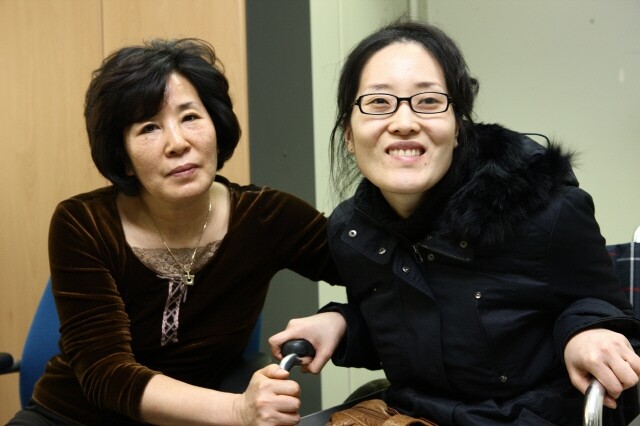hankyoreh
Links to other country sites 다른 나라 사이트 링크
Samsung LCD worker receives industrial accident recognition 15 years after developing brain tumor

After eight attempts, industrial accident recognition has been granted to Han Hye-gyeong, a former Samsung Electronics worker who has fought for recognition for the past 15 years since becoming the first to report a brain tumor developed while working at the company’s LCD factory.
On June 5, the semiconductor worker health and human rights watchdog group Banollim announced that the Seoul Committee on Occupational Disease Judgment had granted approval on May 30 for a convalescence pay request by Han, 41, who was diagnosed with a brain tumor after working for nearly six years as a production worker at a Samsung Electronics LCD factory. Citing Han’s exposure to harmful agents such as lead, tin, flux, and isopropyl alcohol while working from the young age of 17 as an operator at the LCD factory – today part of Samsung Display – the committee wrote in its judgment that the “possibility of a relationship to her job cannot be ruled out, in light of recent brain tumor judgments and cases of similar diseases recognized by the Judgment Committee.” Other factors named by the committee in its approval included the comparatively lax workplace safety management standards and attitudes of the 1990s, which resulted in workers not wearing protective gear and inadequate safety measures being implemented, as well as the lack of adequate investigation of workplaces prior to 2002.
While working for five years and nine months from November 1995 on a production line in the module division of Samsung Electronics’ LCD sector (now Samsung Display), Han was exposed to lead and organic solvents. After experiencing symptoms including cessation of menstruation during her employment, she left the company in July 2001; four years later in 2005, she was diagnosed with a brain tumor. The tumor was subsequently removed, but the aftereffects resulted in her being designated with Class 1 visual, walking, and linguistic impairments.
Han originally applied for industrial accident recognition in March 2009 after becoming the first person to report a work-related brain tumor the year before to Banollim, which had been fighting for victims of leukemia at Samsung Semiconductors. But the Committee on Occupational Disease Judgment denied the approval. A review by the Korea Workers’ Compensation and Welfare Service (COMWEL) and a second review by the Ministry of Employment and Labor ensued, and the case went through three trials all the way through the Supreme Court in January 2015 – but the conclusions remained the same. A renewed application in October of last year was denied by the Yongin branch of COMWEL, but with its latest decision the Seoul Committee on Occupational Disease Judgment overturned that ruling and sided with Han. Coming 14 years after the tumor was first diagnosed, the decision meant a success for Han in her eighth attempt in the 10 years since her first industrial accident recognition application.
“I was thrilled to hear the news that industrial accident status was granted,” Han said.
“I hope that if there are cases of injuries or disease that occur in workplaces in the future, the responsible organization will handle it promptly so that cases like mine don’t occur,” she added.
To celebrate the ruling in Han’s case, Banollim plans to hold a music recital titled “You Have the Scent of Flowers” at the Franciscan School in Seoul’s Jeong-dong neighborhood on June 14.
By Jeon Jong-hwi, staff reporter
Please direct comments or questions to [english@hani.co.kr]
Editorial・opinion
![[Editorial] Does Yoon think the Korean public is wrong? [Editorial] Does Yoon think the Korean public is wrong?](https://flexible.img.hani.co.kr/flexible/normal/500/300/imgdb/original/2024/0417/8517133419684774.jpg) [Editorial] Does Yoon think the Korean public is wrong?
[Editorial] Does Yoon think the Korean public is wrong?![[Editorial] As it bolsters its alliance with US, Japan must be accountable for past [Editorial] As it bolsters its alliance with US, Japan must be accountable for past](https://flexible.img.hani.co.kr/flexible/normal/500/300/imgdb/original/2024/0417/6817133413968321.jpg) [Editorial] As it bolsters its alliance with US, Japan must be accountable for past
[Editorial] As it bolsters its alliance with US, Japan must be accountable for past- [Guest essay] Amending the Constitution is Yoon’s key to leaving office in public’s good graces
- [Editorial] 10 years on, lessons of Sewol tragedy must never be forgotten
- [Column] A death blow to Korea’s prosecutor politics
- [Correspondent’s column] The US and the end of Japanese pacifism
- [Guest essay] How Korea turned its trainee doctors into monsters
- [Guest essay] As someone who helped forge Seoul-Moscow ties, their status today troubles me
- [Editorial] Koreans sent a loud and clear message to Yoon
- [Column] In Korea’s midterm elections, it’s time for accountability
Most viewed articles
- 1Samsung barricades office as unionized workers strike for better conditions
- 2[Column] The clock is ticking for Korea’s first lady
- 3[Editorial] When the choice is kids or career, Korea will never overcome birth rate woes
- 4Why Israel isn’t hitting Iran with immediate retaliation
- 5[News analysis] After elections, prosecutorial reform will likely make legislative agenda
- 6S. Korea, Japan reaffirm commitment to strengthening trilateral ties with US
- 7Japan officially says compensation of Korean forced laborers isn’t its responsibility
- 8[Editorial] As it bolsters its alliance with US, Japan must be accountable for past
- 9[Editorial] Does Yoon think the Korean public is wrong?
- 10[Guest essay] How Korea turned its trainee doctors into monsters